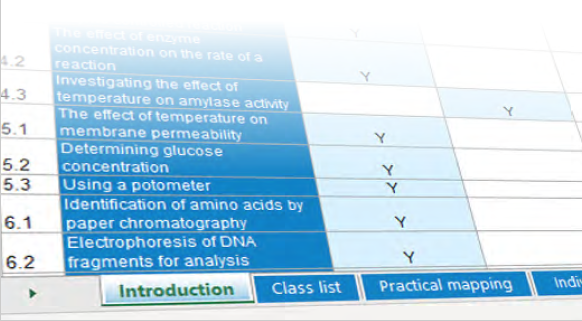Introducing the new portable tracker for A Level Biology, Chemistry and Physics
29 July 2021
Andy Brunning – Chemistry Subject Advisor

Tracking student progress in the A Level science practical endorsement can be challenging, particularly if you have a large number of students or if you want to share trackers between teachers. We’ve been listening to your feedback, and in this blog I want to introduce our new ‘portable’ tracker and how it might be able to help you.

A lot of feedback about our ‘fixed’ and ‘flexible’ practical endorsement trackers is positive. You’ve told us you like the ease with which you can tweak practical activity mapping and add your own activities. However, we know that these trackers can also get quite sluggish if you have a lot of students, and they also can’t be imported into online sharing tools such as Google Sheets to make using them even easier.
The new portable tracker
Enter our new portable tracker, which we’ve designed to be simpler. It still has a lot of the functionality of the fixed and flexible trackers: it pre-maps all of our suggested practical activities for you. And like the existing trackers, it has space for you to add your own activities, giving you the flexibility in choosing practical activities that’s unique to OCR. But the new tracker also has some additional features which we hope will make it an attractive alternative.
Unlike the existing trackers, the portable tracker can handle large numbers of students without slowing down. And while the fixed and flexible trackers lose functionality if you try and import them into online tools like Google Sheets, the portable tracker can be imported with no issues, making it easier to share across your department.
Teachers switching to us from other boards are sometimes unsure how the 1.2.1 practical skills and 1.2.2 apparatus and techniques fit in with the Common Practical Assessment Criteria (CPAC). To make this clearer, we’ve provided the mapping of the 1.2.1 criteria to the CPAC within the portable tracker, and we’ve also simplified the tracking of student achievement so that the CPAC achievement tracks automatically.
Unlike our fixed and flexible trackers, the portable tracker doesn’t automatically mark 1.2.1 and 1.2.2 skills as ‘achieved’ when a practical is completed. Feedback from our practical endorsement monitors has been that some schools required needed additional guidance during monitoring visits as they had not changed any skills from ‘achieved’ when using the fixed or flexible trackers. This helps you to consider whether each student has met the criteria being assessed, without significantly increasing the administrative burden.
Our portable tracker is also more open. Whereas the fixed and flexible trackers are locked to prevent accidental edits causing loss of function, the simpler design of the portable tracker means we haven’t password protected it. We have locked some cells to prevent accidental changes, but if you do want to make changes to it to suit your centre then it’s possible for you to do so.
Is it right for you?
While we know some teachers will be eager to use the new tracker, there’s no requirement for you to do so. If you’re using our fixed or flexible trackers, or even a suitable tracker of your own, and you’re happy with them, then you can continue to use them. But if the current trackers aren’t ideal for your centre, we hope the new portable tracker resolves any issues.
You can download the new portable tracker, along with the older fixed and flexible trackers, on the Science coordinator materials page on Interchange. You’ll need to ask your exams officer for access if you can’t currently view this page. We’re always keen to hear your feedback, so let us know how you get on with the trackers and if you run into any issues.
If you need help using any of our trackers, we’ve produced a tutorial video for our fixed, flexible and portable trackers, demonstrating how to use them to modify or add activities and track your students’ progress.
Stay connected
If you have any further questions, you can email us at science@ocr.org.uk, call on 01223 553998 or tweet @OCR_Science. You can also sign up to subject updates to receive information about resources and support.
About the author
Andy joined OCR in September 2017 as the subject advisor for A Level Chemistry. He has a Chemistry BSc and a Secondary Science PGCE from the University of Bath. Before joining OCR, he worked as a chemistry teacher in Bournemouth and Cambridge. He also sidelines as a science communicator and has produced infographic projects for the Royal Society of Chemistry and the American Chemical Society.